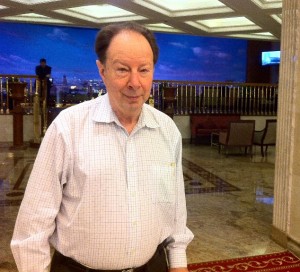When Sidney Altman walks into the gilded lobby of Hotel Ukraine in central Moscow, the question seems inevitable: Could current political tensions destroy scientific relations that took years to build? The American scientist visiting the Russian capital for the first time does not take long to answer.
“They might, but they should not. Politics cannot be allowed to intrude on science and research. We must not let that happen”, says the Yale professor when we meet for a short chat ahead of his seminar at Skoltech. “I see myself part of this project and my commitment has not changed because of international tensions.” In fact, he adds, he currently contemplates deepening his relationships with Russian researchers working an institute in Novosibirsk.
Perhaps at the age of 75 Altman, one of America’s most eminent molecular biologists, can pursue unorthodox ideas without worrying too much about repercussions. Perhaps that is exactly the attitude which won him a Nobel Prize in chemistry for the discovery of catalytic properties of RNA. And perhaps that is what happens when a veteran researcher who won the Nobel prize decides to give humanity a gift of unmeasured value: eradicating malaria.
To make good on a vision of saving millions of lives he needs to convince the world that the blockbuster drugs currently marketed by pharmaceutical companies will pale in comparison to his unique solution. Altman and his team suggest that large nucleic acid molecules can easily bind to the RNA of the parasite that causes malaria and debilitate it. “It might be quite easy, easier than what most people think”, the science man coolly describes his quest to destroy a disease that claims the lives of more than half a million people a year.
The prestige he enjoys as a Nobel laureate buys him respect worldwide. People listen. Researchers, students, journalists, even the representatives of drug companies, are attentive when he speaks. And he does, whenever and wherever he can.
“It is working in the lab. We can stop the growth and development of various strains of malaria that are resistant to all the drugs we have today.” He enthuses when he speaks of a new age of antibiotics.
So what stands between him and becoming a 21st century Louis Pasteur? Funding, or rather, lack thereof. Funding is the other crucial part of the equation.
“The problem is the big pharmaceutical companies, relying on small molecules and their derivatives for treatment. They were not very successful so far. But they would not develop a new big-molecule solution, because it costs them too much money to try out. It is inexcusable. But perhaps if I could find a million dollars to repeat the initial results my team found with mice, then we would stand a chance of persuading pharmaceutical companies to invest.”
Enter the Russian government. It granted an estimated 90 million rubles (2.5 million dollars) to the researchers Altman is associated with at the Institute of Chemical Biology and Fundamental Medicine in Novosibirsk.
“I think it’d be ideal to start my effort in Russia. Russian pharmaceutical companies have never been on par with Europe and America in terms of developing drugs. But because of that, there is a potential and an opportunity here. New antibiotics can be tested and developed in Russia and the process would even be less expensive. I am sure it can be done here. And that is what matters: find a solution.”

Sidney Altman in Moscow, 11.05.2104. Photo: Ilan Goren
3 things you want to know about Sidney Altman
-
Growing up in Montreal, Canada, he used to be a hockey player and a fan of the game. Not anymore. “Professional hockey now is a much rougher game. The finesse and beauty have disappeared from the upper levels. It’s not the same game as it was in the 1960’s and 1970’s when big Russian players like Vladislav Tretiak and Valeri Kharlamov ruled the rinks”.
-
He studied Russian for two years so he could read the great masters of prose and poetry: “Pushkin, Turgenev, Tolstoy, Dostoyevsky. I read them all, in Russian.”
-
His only word of advice to students boils down to two words: “Hard work. You cannot work with any concept of public recognition, fame, money and all that. That’s a terrible curse. You have to focus on the science and the problems you’re trying to solve.”
* The Skolkovo Institute of Science and Technology (Skoltech) is a private graduate research university in Skolkovo, Russia, a suburb of Moscow. Established in 2011 in collaboration with MIT, Skoltech educates global leaders in innovation, advance scientific knowledge, and foster new technologies to address critical issues facing Russia and the world. Applying international research and educational models, the university integrates the best Russian scientific traditions with twenty-first century entrepreneurship and innovation.
